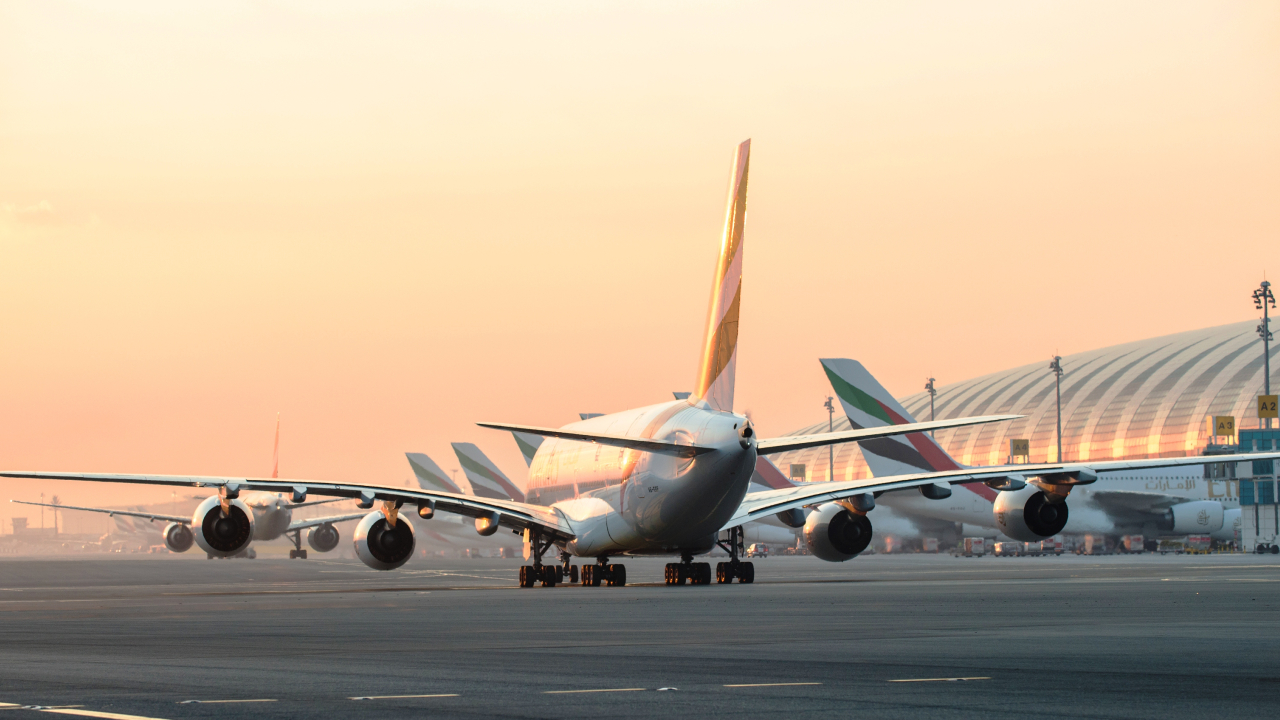U.S-Iran strike exchanges trigger widespread flight disruptions
The exchange of military strikes between the U.S. and Iran has triggered a rapidly evolving series of commercial airline operational changes in the region including temporary airspace closures. Aviation Week reports.

The UAE also closed its airspace before Iran’s response. Image: Dubai Airports Company
Airspace over Qatar and the United Arab Emirates (UAE) shut down ahead of Iran’s response after Tehran provided advanced warning of its move. The attack involved 14 missiles targeting Al Udeid Air Base outside of Doha--the U.S.’s largest base in the region. The U.S. has had troops at the base for more than 20 years.
Qatari officials, citing “developments in the region,” said in a June 23 statement its airspace would be closed “as part of a set of precautionary measures.” The move effectively grounded state-owned carrier Qatar Airways.
The announcement came on the heels of a NOTAM that closed Al Udeid. The NOTAM said the base—an expected target in any Iranian retaliation--would be closed for eight hours, until 2020 UTC June 23.
The UAE also closed its airspace before Iran’s response. Traffic in and out of Dubai International Airport, a hub for both Emirates Airline and flydubai, was disrupted before the Iranian response, with flight-tracking websites showing several inbound flights diverting. Flights at Abu Dhabi’s Zayed International Airport, home of Etihad Airways, were also disrupted. UAE departures and arrivals resumed not long after Iran’s brief attack.
Bahrain and Kuwait also closed their airspace around the time of Iran’s strike.
Iran’s response and the airspace closures followed a series of flight schedule changes and re-routings in the wake of U.S. air strikes on Iran June 22. The attacks, part of the broader Israel–Iran conflict, marked a sharp escalation in regional instability and have triggered immediate consequences for international air travel.
Major Gulf and international carriers have canceled flights to Iran, Iraq, Israel, Syria and neighbouring markets, while also diverting aircraft around the region. Emirates has halted operations to Baghdad, Basra and Tehran through June 30, while Etihad has suspended its Abu Dhabi-Tel Aviv service until at least July 15.
Qatar Airways earlier suspended flights to and from Iran, Iraq and Syria—impacting nine routes from Doha—while flydubai has halted operations to those countries, as well as to Israel and St. Petersburg, Russia, through the end of June.
Other international carriers
European carriers are also scaling back operations in the region. Lufthansa Group has suspended flights to Tel Aviv and Tehran through July 31 and paused service to Amman, Beirut and Erbil into early July. British Airways has halted flights to Tel Aviv through the end of July and suspended service to Amman and Bahrain until June 30. The airline also canceled flights to Dubai and Doha on June 22-23 and diverted one Dubai-bound flight from London Heathrow to Zurich on June 22.
Air France-KLM suspended flights to and from Dubai and Riyadh until June 24. The French flag carrier also suspended Beirut service through June 25 and Tel Aviv flights through July 14. Wizz Air has halted operations to Tel Aviv and Amman until mid-September and is avoiding overflights of Israeli, Iranian, Iraqi and Syrian airspace. Ryanair and airBaltic have also canceled flights to Tel Aviv through late summer.
Air India added to its recent service cutbacks by suspending all Middle East and European operations as well as service to and from the East Coast of North America “with immediate effect,” the airline said late June 23. The move forced at least some in-progress flights to turn back, the airline added.
“Air India is in continuous consultation with its external security advisors and is vigilantly monitoring the evolving situation,” the carrier said, calling the situation “beyond an airline’s control.”
In the days leading up to the U.S. strikes, American Airlines suspended flights to Doha, while United Airlines halted service to Dubai. This followed earlier decisions by both Delta Air Lines and United to suspend operations to Tel Aviv.
Potential retaliatory attacks
Matthew Borie, chief intelligence officer at aviation risk management firm Osprey Flight Solutions, says the widening suspensions to Middle Eastern countries beyond Iran, Iraq, Israel and Syria reflect growing fears of potential retaliatory attacks by Iran.
“Airlines are likely cancelling flights to airports in the UAE and Qatar, as well as to a lesser extent Kuwait, Bahrain and Saudi Arabia, due to concerns about drone, cruise missile and/or ballistic missile attacks by Iran and/or its proxies—the Yemeni Houthis and Iraqi Iranian-backed militant groups—targeting U.S. military bases in these countries,” he explains.
Borie adds that prior to the U.S. strikes, Iranian state media warned the U.S., UK and France that their military bases and naval assets in the region would be targeted if they assisted Israel in defending against Iranian attacks.
Additionally, GPS jamming and spoofing are also emerging as serious concerns for airlines operating in the Middle East. Ground-based systems can broadcast false signals that mislead aircraft navigation systems, potentially sending them off course.
As of June 23, Flightradar24 data shows commercial traffic has largely vanished from Iranian, Iraqi, Israeli and Syrian airspace, with most carriers rerouting via the Caspian Sea, Egypt and Saudi Arabia. The normally busy corridor has remained mostly empty since Israel’s June 13 strikes on Iran, with diversions adding up to 2 hr. to some long-haul routes.
Stay up to date
Subscribe to the free Times Aerospace newsletter and receive the latest content every week. We'll never share your email address.

